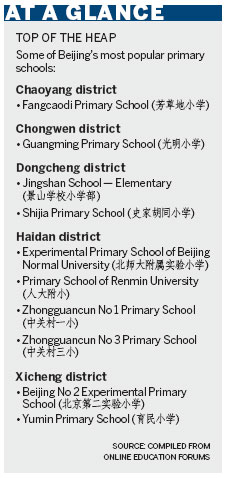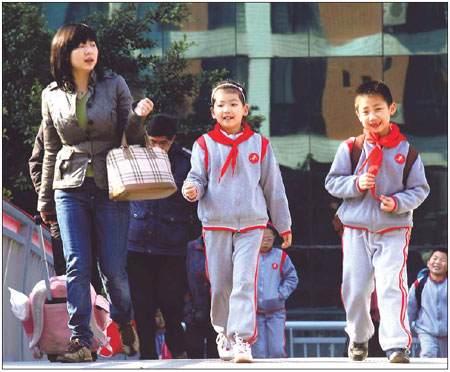Society
Moving with the times
Updated: 2011-06-29 07:52
By Tiffany Tan (China Daily)
|
A woman takes her daughter to school in Fuzhou, Fujian province. Chinese parents have a reputation for pouring their time, energy and resources into educating their children. Zheng Shuai / for China Daily |

Thousands of Beijing families are getting ready to move into homes in the vicinity of sought-after schools, so their children have a better chance of being admitted. Tiffany Tan reports.
Among the many thousands of people changing apartments in Beijing this summer is Jiang Wenjuan's family. The 33-year-old magazine journalist and her husband are moving from their 100 square-meter apartment to one that's almost half the size, all for the sake of quality education for their daughter.
"I'm worried it will take some time to adjust after we move in I'm worried a lot of things won't fit inside (the new apartment)," Jiang says. "But it will all be worthwhile for our child's education."
In September, their 6-year-old daughter Chen Yunze will be starting primary school, a crucial step in a society that for centuries has equated education with success in life. Last year the couple decided to purchase a 60 square-meter apartment in Haidian district, the capital's academic hub and home to some of the city's best primary and secondary schools and universities. Their apartment's price tag: 1.68 million yuan ($260,000).
The couple join a growing number of parents who've made similar purchases since 1998, when the Chinese government fully commercialized urban housing as well as created "school catchment areas", in which public schools can enroll only residents within their districts. The policies spurred families with school-age children to buy homes near schools in renowned school districts - a practice that's become so pronounced it has led to the term "xuequfang" (school district homes).
"In the past five years, transactions for school district homes have steadily risen," says Zhang Yue, chief analyst at Homelink, one of Beijing's largest housing agencies. Between 2007 and last year the number of such transactions in Beijing grew 120 percent, according to the firm.
In Haidian alone, where these types of properties are most in demand, "more than a thousand school district homes were bought last year, about twice the number sold in 2007", she says.
The big demand has naturally led to price increases. "Despite policy controls, the price difference between school district homes and non-school district homes in an area can go as high as 30 percent," says Wang Lei, a branch manager of Mai Tian, another big housing agency in Beijing.
Zhang of Homelink expects the price of these favored homes to maintain their appreciation, which averages 10 percent a year.
Although Chinese parents have a reputation for pouring their time, energy and resources into educating their children, they are not the only ones buying a new home in the name of academic success.
Parents are doing the same thing in countries like England, Australia and the United States, says Professor Joshua Mok Ka-ho, dean of faculty of arts and sciences at the Hong Kong Institute of Education and a scholar in comparative education.
"In the UK, just like Hong Kong, some schools are seen to be very good and so you find families moving around - either renting or really buying property in order to live nearby, to fall into the catchment area. So they have a better chance of being admitted into those so-called elite schools."
Like housing industry insiders, the professor expects the price of school district homes to continue climbing as demand swells - unless new policies are instituted.
"The government has to look into the situation whereby the government subsidizes other schools that are seen to be less privileged, to groom those schools to become more preferred. But I think this certainly needs a State-level policy," says Mok, whose research work covers comparative development and policy studies as well as social development in contemporary China.
"But having said that, I don't think this is easy because this has to do with parents' expectations and perceptions. Even though you groom some new schools to be excellent, still people will jump at tradition or a brand name."
In the meantime, a number of local governments have already requested some of the country's leading schools to send top teachers along their way to help improve the quality of their services, says Gao Yimin, vice-director of Beijing Normal University's Center for Comparative Education.
Four summers down the road, a father named Tu Hongwei will likely be among the Beijing residents changing homes. He, together with his wife and young daughter, will move from their 80 square-meter apartment in Chaoyang district to a rented one in Dongcheng.
"Even a normal Dongcheng high school is better than any Chaoyang high school," says Tu, 33, who works for the Ministry of Commerce. His family actually has a 40 square-meter apartment in Dongcheng, but he considers it too small to be comfortable. The important thing is that the property, which they purchased in 2010, has given them residency within the district.
Their daughter Tu Hua may have only been 11 months old at the time, but in China it doesn't hurt to start planning early.
"What I want to give her is a better education, a bigger opportunity to go to good schools later on," Tu says.
Guo Shuhan and Lin Qi contributed to this report.
E-paper

Shining through
Chinese fireworks overcome cloudy times, pin hopes on burgeoning domestic demand
Pen mightier than the sword
Stroke of luck
Romance by the sea
Specials

90th anniversary of the CPC
The Party has been leading the country and people to prosperity.

My China story
Foreign readers are invited to share your China stories.

Green makeover
Cleanup of Xi'an wasteland pays off for ancient city

